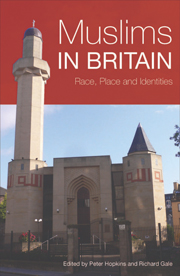Book contents
- Frontmatter
- Contents
- Acknowledgements
- List of contributors
- List of tables
- List of figures
- 1 Introduction: Muslims in Britain – race, place and the spatiality of identities
- Section 1 Gender, place and culture
- Section 2 Landscapes, communities and networks
- 6 British Arab perspectives on religion, politics and ‘the public’
- 7 The multicultural city and the politics of religious architecture: urban planning, mosques and meaning-making in Birmingham
- 8 Holy places, contested spaces: British Pakistani accounts of pilgrimage to Makkah and Madinah
- 9 Excess baggage or precious gems? The migration of cultural commodities
- Section 3 Religion, race and difference
- Afterword
- Index
9 - Excess baggage or precious gems? The migration of cultural commodities
from Section 2 - Landscapes, communities and networks
Published online by Cambridge University Press: 05 August 2013
- Frontmatter
- Contents
- Acknowledgements
- List of contributors
- List of tables
- List of figures
- 1 Introduction: Muslims in Britain – race, place and the spatiality of identities
- Section 1 Gender, place and culture
- Section 2 Landscapes, communities and networks
- 6 British Arab perspectives on religion, politics and ‘the public’
- 7 The multicultural city and the politics of religious architecture: urban planning, mosques and meaning-making in Birmingham
- 8 Holy places, contested spaces: British Pakistani accounts of pilgrimage to Makkah and Madinah
- 9 Excess baggage or precious gems? The migration of cultural commodities
- Section 3 Religion, race and difference
- Afterword
- Index
Summary
Introduction
In writing a chapter on the processes of social and spatial transition in relation to those who follow the faith of Islam, it is necessary to understand that the Muslim umma (community) is a global one and is by its very nature diverse, embracing varying histories, ethnicities, languages and economic conditions. Therefore, sweeping generalisations cannot be made in relation to a ‘community of communities’ that falls within this broad category labelled Islam.
At a time when British Muslim identity has come to the fore and there is increased discussion around the issue of integration, the Nizari Ismaili Muslims, a minority Shia Muslim community that has successfully integrated, has been largely overlooked. Furthermore, most of the previous research on the identities of Muslims in Britain has focused on disadvantaged and less-well integrated groups (Modood et al. 1997; Ahmed et al. 2001; Begum and Eade 2005). Our aim is to provide a detailed analysis of the way in which cultural commodities of the Nizari Ismaili Muslims of Gujarati ancestry have changed as a result of the migration process from India to East Africa and subsequently to the United Kingdom.
This research is based on empirical findings from three qualitative/ ethnographic studies (Mawani 2002, 2006; Mukadam 2003) and is interdisciplinary, as it focuses on language, identity, culture and religion. The interviews were semi-structured in nature and ranged from forty-five minutes to an hour in length, with a focus on respondents' personal accounts and perspectives in relation to the migratory processes, adaptation, integration and settlement.
- Type
- Chapter
- Information
- Muslims in BritainRace, Place and Identities, pp. 150 - 168Publisher: Edinburgh University PressPrint publication year: 2009



